On November 7th and 8th, 2023, the Soil Health Institute (SHI) and the University of Missouri Center for Regenerative Agriculture (CRA) held an in-person education event for state technical assistance (TAs) providers in Ankeny, IA, as part of the Farmers for Soil Health (FSH) Climate-Smart Commodities Partnership. The FSH Collaboration, covering 20 states across the Midwest, Great Lakes, and Chesapeake Bay, aims to boost cover crop adoption on 30 million corn and soy acres by 2030. SHI and CRA lead the FSH education team, collaborating with individual TA leads in each state to offer education and resources for successful adoption of soil health management systems.
The 2-day event brought together TAs and advisors representing a multitude of organizations and affiliations, including North Dakota State University Extension, Conservation Technology Information Center, The Nature Conservancy, New Vision Coop, Precision Conservation Management, Kansas Soil Health Alliance, Kansas Association of Conservation Districts, Heartland Soil Services, Iowa Soybean Association, Missouri Soybean Association, and Illinois Corn Growers Association. Additional project partners and local technical service providers, including Ben West, FSH Executive Director, and Jack Cornell, Director of Sustainable Supply for the United Soybean Board (USB), were also in attendance. SHI’s Erin Gundy and Ann Marie Calabro facilitated the event, drawing 48 participants from 9 states.
November 7
The event commenced with a welcoming address from Ann Marie Calabro, SHI Program Manager & Soil Health Educator. The first session, led by Ben West, provided an overview of FSH, followed by an informative Q and A session with Jack Cornell, covering FSH background and objectives.
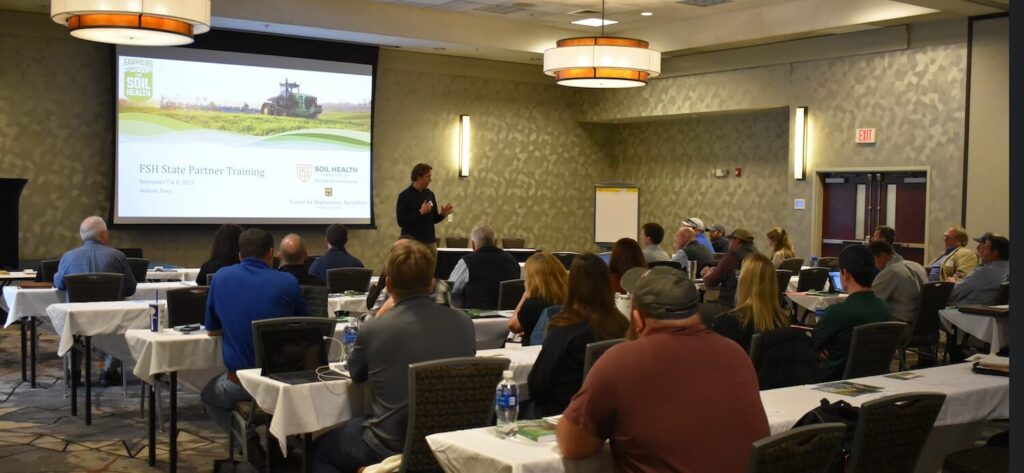
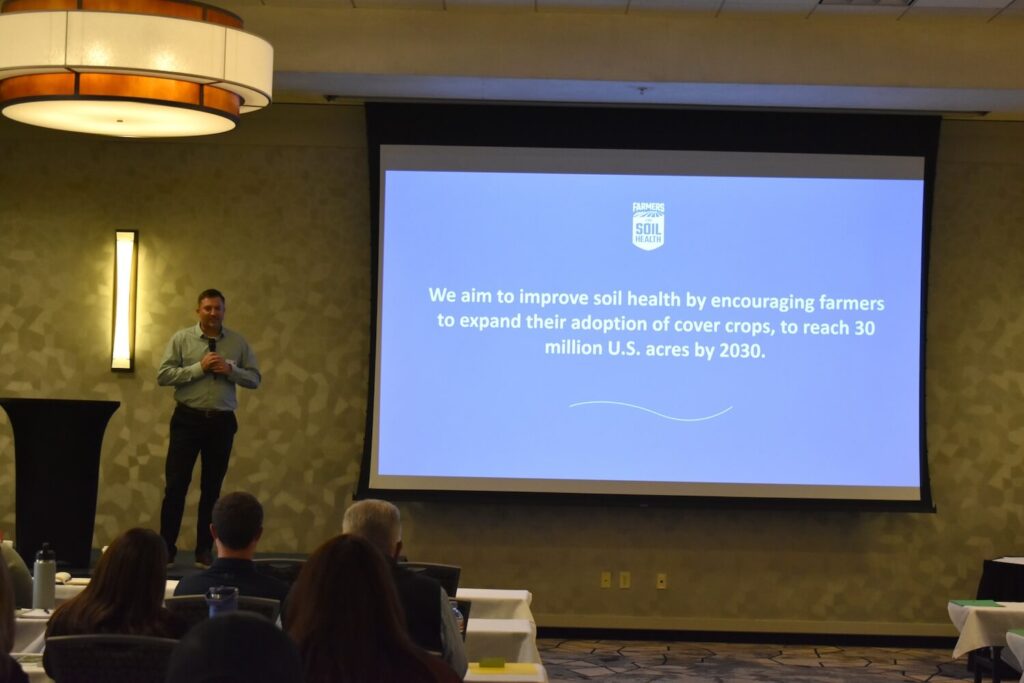
Next, participants engaged in an interactive activity centered on ‘working backward’ from a conservation plan, allowing attendees to form groups, brainstorm, network, and share ideas. Each group had the opportunity to reflect on their experiences in supporting farmers to effectively integrate cover crops into their operations and collectively identify minimum technical elements that farmers need to know.
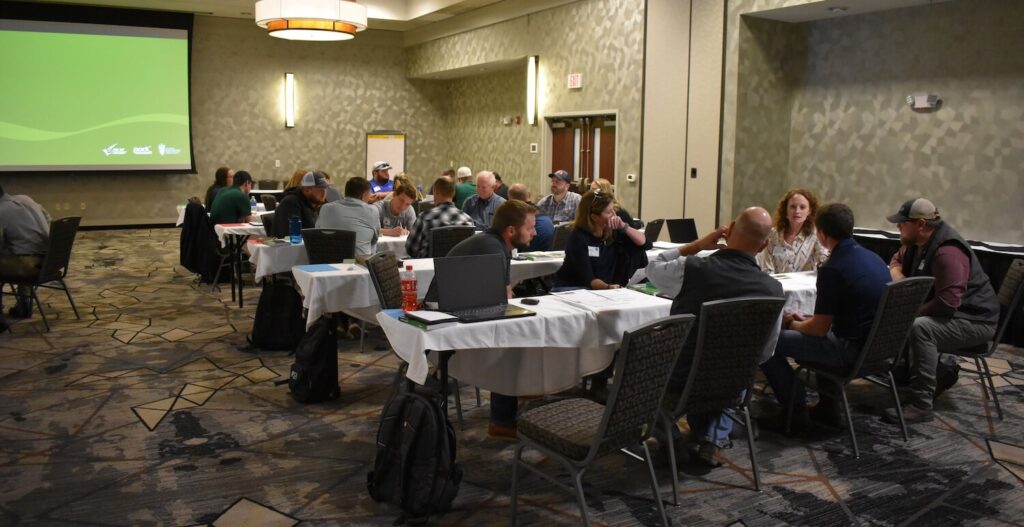
Bethany Bedeker, CRA Cover Crop Outreach Manager, and Rob Myers, CRA Director, kicked off the day 1 technical sessions, discussing the benefits of soil health practices and providing recommendations for selecting region-specific cover crop species.
Throughout the project, FSH partners have compiled extensive resources for advisors, farmers, and landowners, including outreach templates, videos, podcasts, factsheets, FAQs, and more housed on the FSH website. Erin Gundy, SHI Soil Health Educator, provided an overview of these resources and insights on upcoming additions.
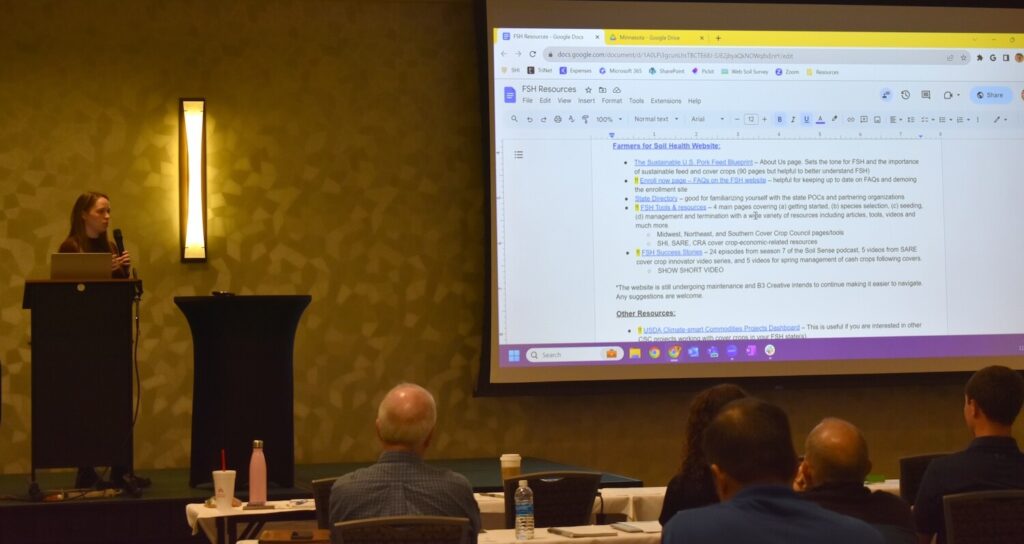
Day 1 wrapped up with a panel discussion led by SHI Soil Health Educator, Shannon Moeller. Landowner Jean Eells and farmers Steve Anderson and Chris Deal shared their experiences in integrating cover crops and soil health practices into their operations, offering valuable insights for TAs working with farmers and landowners in their respective states.
November 8
Day 2 of the education program kicked off with engaging discussions focused on the economics of soil health. Rob Myers started the session by presenting the National Cover Crop Survey results, an annual survey conducted by the Conservation Technology Information Center (CTIC) and the Sustainable Agriculture Research & Education (SARE) program. Ann Marie Calabro followed with an overview of results from SHI’s economic case studies, specifically highlighting the economics of soil health systems on 100 corn and soy farms across 9 Midwest states. Laura Gentry, Director of Water Quality Research at Illinois Corn, concluded the economic segment by explaining the purpose and outcomes of the Precision Conservation Management (PCM) program in Illinois.
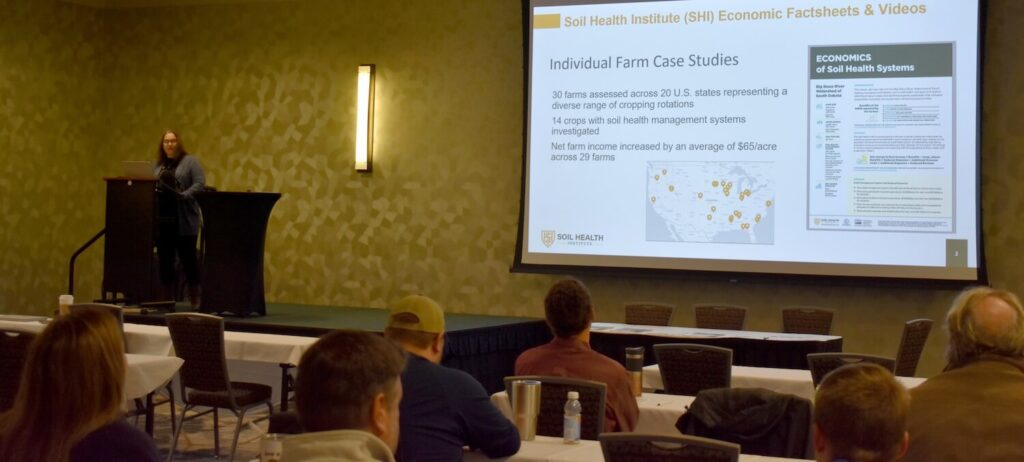
One of the primary goals of the FSH project is to engage historically underserved producers, and state TAs will receive continuous education to conduct outreach and provide support to these communities throughout the project period. Liz Kolbe, Farmer-Led Education Director at Practical Farmers of Iowa (PFI), provided an insightful overview of PFI’s efforts in working with these communities, highlighting essential dos and don’ts while underscoring the significance of collaborative efforts between organizations.
Abigail Peterson, Director of Agronomy at the Illinois Soybean Association, wrapped up day 2 by providing attendees with important considerations to keep in mind when advising farmers on cover crop termination techniques and planting cash crops after cover crops.
Learn More, Stay Connected
SHI and CRA will continue to host virtual and in-person education events over the next three years to support the FSH education team. Virtual webinars will be open to everyone and geared towards farmers, landowners, and TAs.
Farmers and other landowners are encouraged to utilize the FSH website to find tools and resources that will assist with implementing and managing cover crops. Find more information and connect with local technical assistance here: www.farmersforsoilhealth.com.
SHI staff working on the FSH project are listed below. Reach out if you have questions!
Erin Gundy, Soil Health Educator: egundy@soilhealthinstitute.org
Ann Marie Calabro, Program Manager & Soil Health Educator: acalabro@soilhealthinstitute.org